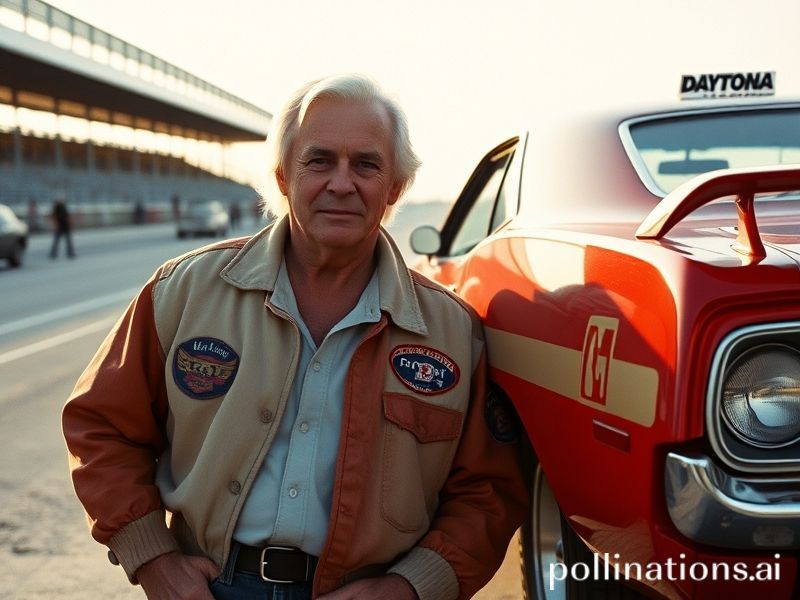Paul Newman’s Global Afterlife: How a Dead Movie Star Became the World’s Favorite Salad Dressing
Paul Newman, the man who once smirked at us from a thousand movie posters, has been dead for sixteen years, yet his face still sells salad dressing on every continent where supermarkets have refrigeration. From Lagos to Ljubljana, shoppers reach for the same genial grin in a jar, proving that global capitalism can turn even a deceased Oscar winner into a condiment ambassador. It’s the sort of resurrection the Vatican can only envy, accomplished not with incense and miracles but with balsamic vinegar and a non-profit loophole.
Newman’s cinematic ghost roams the planet in subtitled reruns: Cool Hand Luke sweating under a Floridian sun that looks suspiciously like the one currently roasting asylum seekers in the Sonoran; The Hustler chalking cues in smoky pool halls that Beijing hipsters now recreate as “vintage” bars serving ¥78 negronis. His politics—those quaint mid-century notions about civil rights and nuclear disarmament—are politely ignored by streaming algorithms that prefer to market his azure eyes as a lifestyle upgrade. Netflix Thailand promotes Butch Cassidy as “retro bromance,” neatly omitting the part where the outlaws get perforated by the Bolivian army. Nothing kills a binge-watch like historical accuracy.
Meanwhile, the Newman’s Own Foundation has become the accidental United Nations of philanthropy. Last year it sent $57 million to 130 countries, including malaria nets for Malawi and palliative care for Moldova—small mercies in a world where billionaires race rockets like teenagers with Lamborghinis. The irony is exquisite: a man who played scoundrels now funds global virtue through ranch-flavored croutons. Somewhere a Somali nurse administers polio drops financed by microwave popcorn, and nobody pauses to consider the cosmic punchline.
Europe, in its post-heroic smugness, likes to pretend it’s above such sentimental branding, yet Berlin supermarkets still stock Newman’s Own salsa beside Turkish döner sauce. The French, who consider Jerry Lewis an existential threat, permit the vinaigrette because it has “no artificial flavors,” a phrase that passes for moral absolution in the EU. Australians, ever the obedient middle children of empire, buy the pasta sauce in bulk, vaguely comforted that their carbon footprint now comes with a charitable receipt.
The Japanese market, naturally, demanded a limited-edition “Wasabi & Soy” dressing. It sold out in a week, confirming the national talent for turning even dyspepsia into kawaii. In Mumbai, the brand is stocked in gourmet stores where Bollywood producers compare profit margins between olive oil and human souls. Somewhere a Delhi housewife stirs Newman’s Caesar into her salad and wonders, fleetingly, if the blue-eyed man on the label ever danced in the monsoon rain with Sharmila Tagore. He didn’t, but the fantasy ships another crate.
Of course, the cynics—my natural constituency—point out that philanthropy is merely guilt with better PR. Newman’s estate was reportedly worth $600 million when he died, and giving away the salad-dressing profits is like tossing coins from a yacht. Yet the coins keep landing in places where clean water is a rumor. Try hurling shade at a Rwandan orphan clutching a textbook bought by popcorn revenue; the optics are terrible.
And so Newman endures, a posthumous citizen of nowhere and everywhere, his DNA now embedded in supply chains more complex than any Cold War plot he ever filmed. The planet burns, democracies crumble, but somewhere a Mongolian herder sprinkles Newman’s Own Caesar on imported romaine and feels, for a moment, cosmopolitan. If that isn’t the definition of soft power, I don’t know what is.
In the end, perhaps the joke is on us. We believed we were buying salad dressing when we were actually purchasing a small, edible piece of American redemption—one that travels better than democracy and expires long after the next fiscal quarter. Newman knew the con; he just had the grace to smirk while running it. The rest of us are still licking the spoon.







